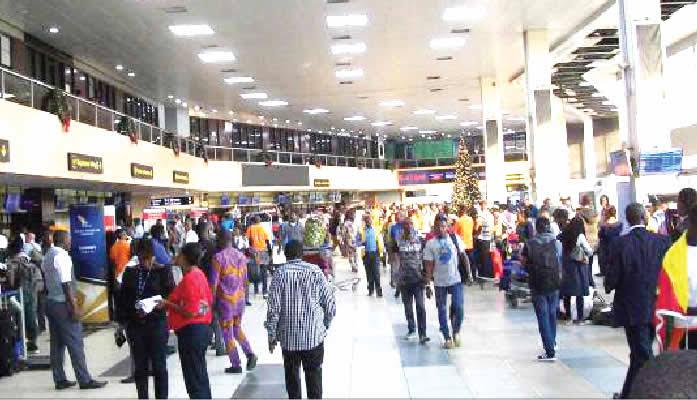Thousands of airline passengers on the Middle-East aviation corridor are bracing for an increase in air fare, flight delays and cancellations, and an increase in flight time as a result of the rerouting of flights due to the Israel-Iran war.
Currently, thousands of passengers are stranded or have their flights rescheduled as airlines scramble to adapt to the evolving security landscape that has made commercial airlines boycott the Gulf corridor.
LEADERSHIP reports that on Thursday 12 June 2025, the Israel Defence Forces (IDF) launched an attack on Tehran’s District 18 at about 03:30 local time (01:00 BST) on Friday, with residential areas in the capital hit.
Israeli Prime Minister Benjamin Netanyahu said the attack – called Operation Rising Lion – targetted “the heart” of Iran’s nuclear programme.
“If not stopped, Iran could produce a nuclear weapon in a very short time,” Netanyahu claimed, but Iran insists its nuclear programme is peaceful.
Consequently, many international carriers have either halted or rerouted flights that normally fly through the Gulf corridor, thereby leading to longer flying hours and increased airfare.
For instance, flights scheduled for the United Arab Emirates, Saudi Arabia, Iraq, Israel, Iran and other countries in the region have been affected, with over 400 flights delayed across the world.
According to www.travelandtour.com, Dubai International Airport witnessed the most severe disruption of all, recording 207 delayed flights and 12 cancellations. Flagship carrier Emirates alone accounted for 71 delays, while FlyDubai followed closely with 69.
Other impacted carriers included Kuwait Airways, Yemenia, Kam Air, Qatar Airways, Pakistan International Airlines, Swiss, My Freighter, and Uzbekistan Airways, all of whom reported a mix of flight delays and cancellations amid the growing regional instability.
Also, British Airways and Air France-KLM cancelled flights on their Dubai, Doha, and Riyadh routes over the weekend, allowing passengers to rebook on revised schedules.
A British Airways flight from London to Dubai was diverted to Zurich after entering Saudi airspace, while another was forced to return to Heathrow after reaching Egyptian airspace. The airline has suspended services to Bahrain, with flights to some Gulf destinations paused until at least the end of June.
Singapore Airlines has suspended its Singapore-Dubai service after a security review while American Airlines has suspended flights to Qatar, and United Airlines to Dubai. Lufthansa has suspended its flights to Tehran and Tel Aviv and has said it will avoid Iranian, Iraqi, and Israeli airspace.
Though the war has little or no impact on Nigeria’s aviation industry as it only affects pilgrims’ flights to Jordan and Israel, even though aviation analysts have argued that the Middle East aviation corridor is vital for global aviation.
They argued that the importance of the Middle East air corridor as a transit route for flights between Europe and Asia has grown further after Russian and Ukrainian airspace largely became off-limits for international carriers following Moscow’s 2022 invasion of Ukraine.
As a result, Europe-Asia flights have been squeezed into just a few narrow channels, passing through the Middle East.
Speaking to Al Jazeera, an aviation analyst and consultant based in the Middle East, Alex Macheras said that with the air corridors affected too, airlines and passengers should brace for impact
“When access to this corridor is disrupted, there is an immediate global ripple effect: aircraft are pushed further south, flight times stretch, and costs surge,” Macheras told Al Jazeera. “For airlines, time is money — and detours cost both.”
“Iranian and Iraqi skies sit on the natural axis between east and west, offering the most direct path for passenger and cargo flights linking Europe with South Asia, Southeast Asia, and beyond,” Macheras said.
Also speaking, the general secretary of the Aviation Round Table Initiative (ARTI), Olumide Ohunayo, said the Nigerian aviation sector and airlines are not directly affected by the escalating conflict as Nigeria has no airlines flying directly on that route.
“Only foreign airlines that have passengers going toward the area or coming to Nigeria from the route will be the ones that will experience a flight change or an increase in fare or a longer flight duration,” he said.
Ohunayo, head of research & corporate travel at Zenith Travel & Consult, noted that the only Nigerian airlines directly impacted are those operating the pilgrims’ flights from Nigeria to Jerusalem.
“The aviation airlines are not directly impacted because we don’t have airlines directly on that route, but for the foreign airlines that have passengers going toward the area or coming, they are in Nigeria are the ones that will experience a flight change or an increase in fare or a longer flight duration,” Ohunayo stated.
An aviation security expert, Capt. John Ojikutu (rtd) reiterated that Nigeria’s aviation sector is not directly affected by conflict.
He acknowledged that countries in the Middle East are closing their airspaces and diverting inbound flights, but said there does not seem to be any threat to the nation’s aviation sector.
“I don’t think we (Nigeria) are affected since we do not have airlines flying there and the UAE Airlines do not seem to be affected.
“More countries in the Middle East are closing their airspaces and diverting inbound flights to Qatar, Bahrain and the UAE. All due to the escalating Israeli/Iran conflict,” Capt. Ojikutu stated.
Flights From Nigeria Face Disruption As Qatar, UAE Close Airspace
Flights from Nigeria to Qatar and United Arab Emirates (UAE) may soon be affected after Qatar and the UAE announced the temporary shutdown of their airspace and ground flights amid escalating tensions in the region.
The shutdown comes as Iran retaliated against the US following strikes on its nuclear sites.
The US State Department had earlier advised its citizens in international locations to “exercise increased caution” after the US bombed three nuclear sites in Iran on Saturday.
Speaking on the implication of shutting down the airspace, the group managing director, Finchglow Holdings, Bankole Bernard, said the airspace shutdown was expected to affect flights from Nigeria especially flights operated by Qatar Airways.
He said that while Qatar Airways had not yet sent an official message to travel agencies, this was expected as flights would no longer be operated around Qatar’s airspace.
“This will affect flights from Nigeria. We are on the verge of a Third World War. Qatar Airways has not sent us a message yet to say they are suspending, but I know they will announce soon. Many airlines have suspended operations to Qatar.
“Qatar Airways operates daily flights to Lagos and Abuja and operates a few weekly flights to Kano. So it’s a huge passenger traffic that would be affected. Qatar still operates today. Qatar is in the Middle East and someone can get on the plane and blow up the plane. So, this is a very tough time to fly,” Bernard said.
Oil Falls 6% As Iran Focuses Retaliation On US Military Base
Oil prices tumbled $5 a barrel, or over 6%, on Monday after Iran attacked a U.S. military base in Qatar in retaliation for U.S. attacks on its nuclear facilities at the weekend.
It, however, took no action to disrupt oil and gas tanker traffic through the Strait of Hormuz.
Brent crude futures were down $4.90, or 6.3%, at $72.19 a barrel by 2:13 p.m. ET (1813 GMT). U.S. West Texas Intermediate crude (WTI) eased $4.60, or 6.2%, to $69.23.
Global benchmark Brent had kicked off the week with nearly 6% jump to a five-month high as markets opened after U.S. President Donald Trump said on Saturday he had “obliterated” Iran’s main nuclear sites in airstrikes, joining an Israeli assault in an escalation of conflict in the Middle East as Tehran vowed to defend itself.
Iran, which is OPEC’s third-largest crude producer, said on Monday that the U.S. attack on its nuclear sites expanded the range of legitimate targets for its armed forces.
The oil market, however, started to sell off after Iran retaliated with a missile attack on the Al Udeid U.S. airbase in Qatar, the largest U.S. military installation in the Middle East.
There was no interruption to QatarEnergy shipments or production after the attack, a source with direct knowledge of the matter said, and no other Iranian attack detected at any U.S. military base other than in Qatar, a U.S. military official told Reuters.
“It is somewhat the lesser of the two evils. It seems unlikely that they’re going to try and close the Strait of Hormuz,” said Kpler analyst Matt Smith.
Iran-Israel War Amid Worsening Global Economic, Security Costs
The war between Israel and Iran escalated when the US on Sunday bombed three key Iranian nuclear sites, adding a new threatening dimension to the conflict as the global economy, especially those of the belligerents, are beginning to suffer a serious downturn.
The security implication of the war is widening as well. On Monday Iran unleashed retaliatory attacks on a US base in Qatar and more attacks on other US bases in the Gulf including Saudi Arabia and the greater part of the Middle East appear imminent. These will lead to mounting economic costs and lives will certainly be lost. Economic costs are escalating, and could be devastating for all parties involved and the rest of the world.
According to Hadi Kahalzadeh, a Research Fellow at the Crown Centre for Middle East Studies at Brandeis University, Israel is already bearing massive economic costs. Estimates suggest that a month-long war could cost Israel around $12 billion, with daily military expenses averaging $725 million. If Iran targets more civilian infrastructure, these costs could escalate sharply. Recall that Israel has spent about $67.5 billion plus infrastructure damage in the Gaza war.
It is estimated that over 5,000 Israelis have already been evacuated from their homes due to missile strikes by Iran causing shortages in labour output. The critical high-tech and industrial sectors are affected.
It is not certain yet if Israel will achieve swift military victory against Iran, which might reduce the risk of more economic strain. However, a prolonged war might drain Israel’s economic growth, weaken its fiscal stability.
On the path of Iran, Hadi estimates that the Persian country is in dire need of over $500 billion in investments to address critical economic shortfalls exacerbated by U.S. sanctions. Israeli attacks have deepened this crisis, destroying vital civilian and energy infrastructure.
The direct costs of reconstruction alone could reach tens of billions of dollars, adding enormous strain to Iran’s already battered economy and limited fiscal resources.
“My estimate draws on the latest 2023 Iranian household expenditure survey, revealing that over 80% of Iranians fail to meet the 2,100-calorie daily requirement and suffer from food insecurity. A prolonged war would only exacerbate this humanitarian crisis, pushing the country toward a potential national catastrophe.
“Iran could retaliate by launching cyberattacks on critical U.S. infrastructure, such as power grids, water systems, pipelines, financial networks, and other essential services. The economic consequences of such cyber retaliation could range from hundreds of billions to over a trillion dollars.
“Further, if Iran targets energy infrastructure in the Gulf states or blocks the Strait of Hormuz, it could disrupt over 20% of global oil and LNG supplies, potentially driving oil prices to as high as $150 per barrel. A Bloomberg analysis warns that sustained prices at this level could shrink global GDP by nearly $1 trillion annually, fueling global stagflation. For the United States, this would severely undermine efforts to control inflation and economic stability,” he said.
There are strong indications that Iran might also close the world’s busiest oil shipping channel, the Strait of Hormuz. This strait takes about 20% of global oil and gas flows through this narrow shipping lane in the Gulf. If Iran succeeds in closing it to international shipping ,this will send shock waves on maritime activities and the consequences for the global economy will be enormous because of the threat of disruption of international trade and potentially jerking up oil prices.
This development may also affect the prices of other goods and services and lead to global economic downturn causing inflation that might have a huge toll on bigger economies, including China, India and Japan, which are among the top importers of crude oil passing through the strait.
Perhaps the biggest apprehension is the insecurity that will reverberate around the world if the Iranian regime becomes desperate especially with the threat of assassination dangling on the head of Iran’s Supreme Leader, Ayatollah Ali Khamenei. The regime has just attacked a US base in Qatar and more US bases in Syria are facing threat of attacks at the time of filing this report.
The global risk of killing the Iranian leader and changing the regime is also of a serious concern to the global community. Any attempt at regime change could mean the US, Israel and any of its allies to send boots on ground, which will cause massive casualties. There is no united force in the country that may replace the Mullahs that could rally the people if the Mullahs of Tehran fall. The situation could be chaotic and for a country of 90 million people, this is not good news for any country.
It is feared that the remnants of the regime loyalists could morph into terror groups and with their proxies around the world they could spread insecurity and protracted quagmire. These could spill to Africa especially Nigeria where the country has demonstrated unbelievable failure in fighting terrorism.





